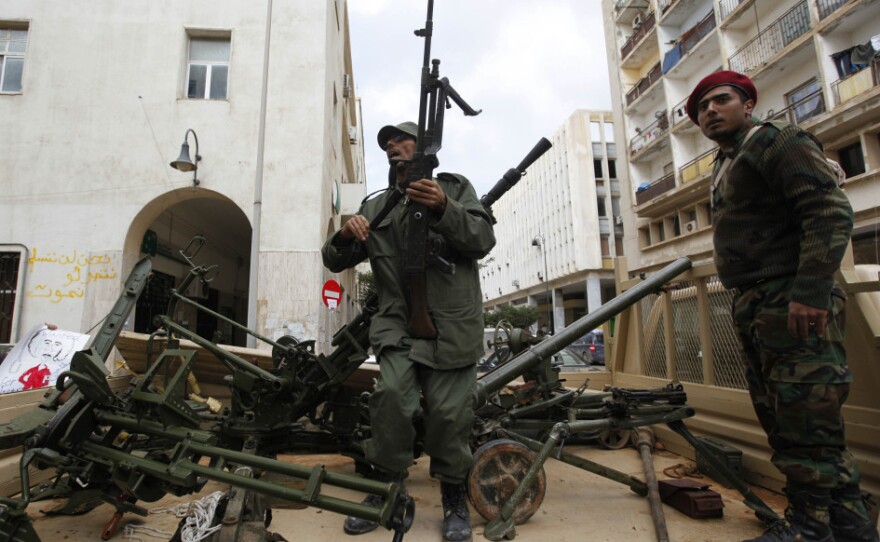Eastern Libya is now completely under the control of forces loyal to the rebellion against President Moammar Gadhafi. Libyan army troops that have defected to join the pro-democracy rebels are trying to organize an offensive against the regime, according to senior military commanders in Benghazi, the birthplace of the uprising.
The force in Benghazi being hailed as the "new Libyan army" loads boxes of tank shells onto flatbed trucks that will take them to a warehouse for storage. Soldiers that once worked for Gadhafi are trying to gather up as much of their looted arsenal as they can for an offensive against the Libyan leader's stronghold in the capital, Tripoli.
In a bustling complex that is the center of the rebel military operations in Benghazi, a senior member of a newly formed military council says that small groups of rebel soldiers have been dispatched to infiltrate the capital. The roads to Tripoli from the east are still largely controlled by pro-Gadhafi forces, he says, and small bands of soldiers attract less attention.
Col. Tarek Saad Hussein says the aim is to take Tripoli. But the obstacle right now is the city of Sirte, Gadhafi's hometown about halfway from Benghazi to the capital. It's heavily reinforced, he says.
The rebels also are trying to pinpoint Gadhafi's location. Hussein says they have information that he is moving from house to house.
In a phone interview from the town of Tobruk, east of Benghazi, another defector from Gadhafi's army, Gen. Suleiman Mahmoud, says that the rebel aim is to bolster beleaguered pro-democracy forces in Tripoli. He said hundreds of young men are volunteering to go fight there.
What's not clear is how unified the fractured military command is, and what kind of effective fighting force can be assembled. Tarek and Mahmoud, for example, are not coordinating their efforts.
Setting Up A Local Authority
At an office in downtown Benghazi, dozens of men are lining up and signing up to help, writing their names and contact details on a register.
People in the east feel flush with the success of their revolution, and they say they want to help liberate Tripoli.
Cpl. Akram Akkaza, another defector, is helping with the recruits. "We have opened the doors to new volunteers to unite and free all of Libya," he says.
The military isn't the only one organizing. The Libyan revolution is only a week old, but in eastern Libya, where the state apparatus has completely collapsed, people are setting up a local authority.
Benghazi has formed committees to oversee food distribution, services, humanitarian aid and garbage collection. A central council that oversees all the groups in Benghazi is coordinating with the leadership in other cities in the region.
The Horrors Of The Past
Despite the brutal crackdown in Benghazi, the streets now are calm. Some banks have reopened, and there is little evidence of widespread destruction — except at the main military base.
As men dance and chant on a tank, around them are destroyed and looted buildings. The last pro-Gadhafi forces in the city were holed up here until a few days ago. Hundreds of Benghazi residents came Thursday to celebrate the victory.
Jamal Mohammed Falah, 40, was among them. He says he lived his entire life under Gadhafi's rule and wanted to show his son that a better leadership will be coming to Libya.
The horrors of the past one were on full display in the army base, though.
At first using shovels, and then with a giant digger, men hunted for underground secret prisons, where they suspect people were either detained or buried. One underground area had blood smeared on the floor. Young men said they had discovered soldiers who were being held for refusing to fire on protesters. It was impossible to confirm their account. But they treated the dank cave like a shrine.
Such was the frenzy and fear at the base that people kept shouting out that they could hear voices echoing from underneath the ground. No one was discovered Thursday, though.
Jamal el Kour was watching the scene. A member of the banned Muslim Brotherhood who was once imprisoned, he cried as he watched people digging.
"I'm just ... imagining myself that I'm one of them," he says. "It's something unbelievable. No human can describe this."
What happened under this regime can never be forgiven; Libyans will be free or die trying, he says.
Copyright 2022 NPR. To see more, visit https://www.npr.org. 9(MDAzMjM2NDYzMDEyMzc1Njk5NjAxNzY3OQ001))







